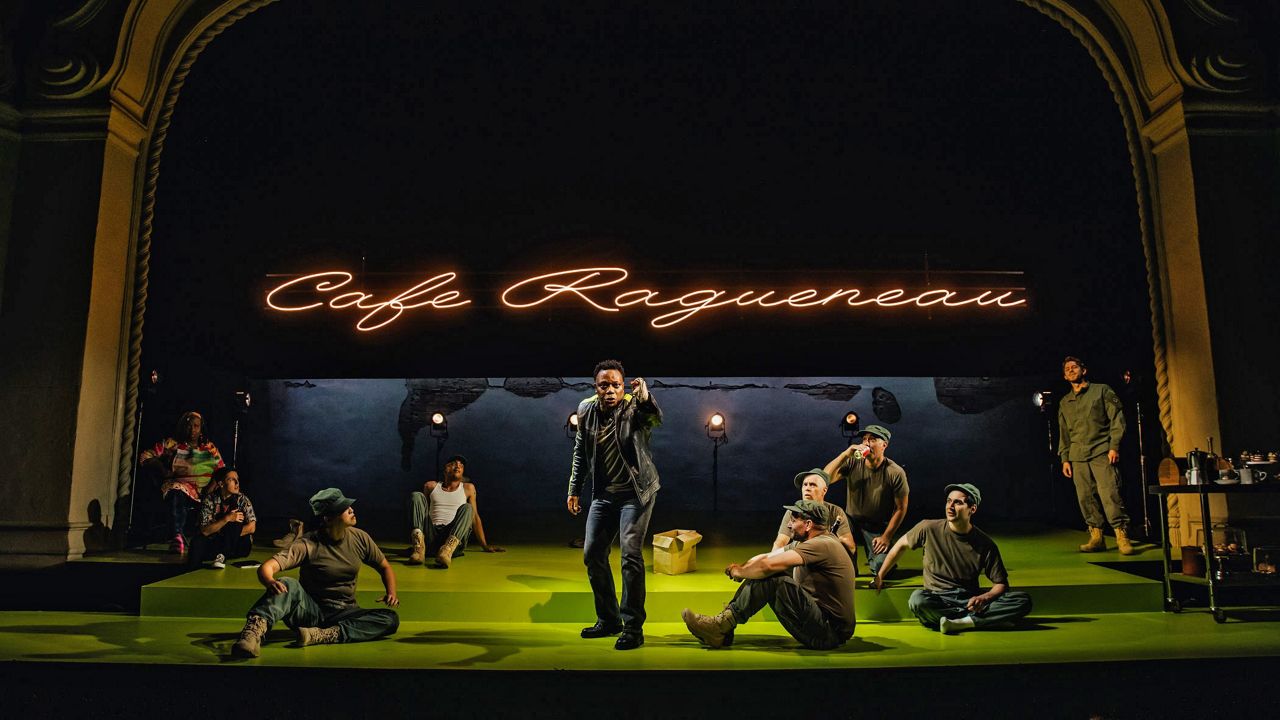PASADENA, Calif. — The tale of “Cyrano de Bergerac” is one that by now seems as old as time. After all, the play by Edmond Rostand was written in 1897 and has been translated and reimagined countless times on stage and film.
In fact, it was even done at the Pasadena Playhouse in 1927. So what is it about this story that keeps us coming back for more?
What You Need To Know
- “Cyrano de Bergerac” was written by Edmond Rostand in 1897 and has been translated and reimagined countless times since, including a 1927 production at Pasadena Playhouse
- This new “Cyrano de Bergerac,” freely adapted by Martin Crimp, features a script that actor Chukwudi Iwuji describes as “very modern, very funny, very witty"
- Film and TV actress Rosa Salazar makes her stage debut as what she calls “a Roxane with very sharp teeth"
- “Cyrano de Bergerac” runs at Pasadena Playhouse through Sept. 29
Chukwudi Iwuji said it’s really quite simple. A good love story, told in a beautiful language, about something we can all relate to…no matter the size of our nose.
“We all know what it’s like to look in the mirror and see something that other people don’t, but we see,” he explained. “To look in the mirror and think I’m not beautiful. Or to desire someone and never have the courage to tell them. Whether you’re a 14-year-old or a 44-year-old.”
Playing the warrior poet, as he describes Cyrano, has always been on his bucket list. And as a well-versed Shakespearean actor, the original text would have been no challenge. But this latest production at Pasadena Playhouse, freely adapted by Martin Crimp, adds a sense of youth and excitement.
“This is new,” Cyrano said almost breathlessly as he stands unseen behind Roxane. “This is exceptional.”
“What we have is a script that is completely loyal to the verse and the rhyme of the original,” Iwuji said. “But made very modern, very funny, very witty. So it pulls the audience in.”
It certainly had that effect on Will Hochman, who plays the less eloquent but equally love-struck Christian.
“When I read the script the first time, I was really drawn to the language. I grew up, 90s hip hop, Brooklyn, rap, poetry,” he described. “To get to be a part of a play that uses language in that way felt like a fairly unique opportunity.”

Rosa Salazar is making her stage debut as the third side of this love triangle, and she understands exactly what her character is going through.
“It’s about the evergreen struggle of trying to find everything in one person,” she mused.
Like the language, she wants to give audiences a Roxane who is modern, driven and even manipulative.
“I want them to see a more ferocious Roxane, a Roxane with more agency,” she said. “I’ve seen a lot of very demure, very, you know, wistful Roxanes. And I want to see a Roxane with very sharp teeth.”
Demure is a word that’s having a viral moment, much like the neon green bratty color of the stage. This is clearly a Cyrano for the digital age, which is possibly the perfect time for this timeless story.
DMs and dating apps allow anyone to be duplicitous, hiding behind avatars and AI generated words.
“We’re all separated, and that’s not how we’re wired,” Hochman said. “It’s not how we’re made. It’s not how we want to be. One of the amazing joys and gifts of theater is it puts … 700 people in a dark space, to experience one thing together. If we can all just get out of the way, then something bigger and more powerful can come through us and touch all of us. And, if that means putting our phones down for, you know, two and a half hours to experience, that feels really meaningful and rare.”
“There’s a benefit to technology, there’s no doubt about that,” Iwuji said, but also acknowledged there is a cost that comes with it. “Take any picture at any time on any cross street in any major city, and it’s a weird zombie world of people walking, looking down like this at their phones… as opposed to up at other people.”
This version of “Cyrano” never hints as precisely when it is set. It could be the 17th century, or the 19th or the 21st. Iwuji says that’s the beauty of good art.
“When you’re watching it, I know I feel this a lot with Shakespeare, you feel did they just tweak the original script to make it work for today?” he said, “Because it seems like they’re talking about stuff happening today.”
A story for the ages with a warning about living life behind a filter.



